初中英语时态的基本句式
初中英语语法八大时态总结(完整版)
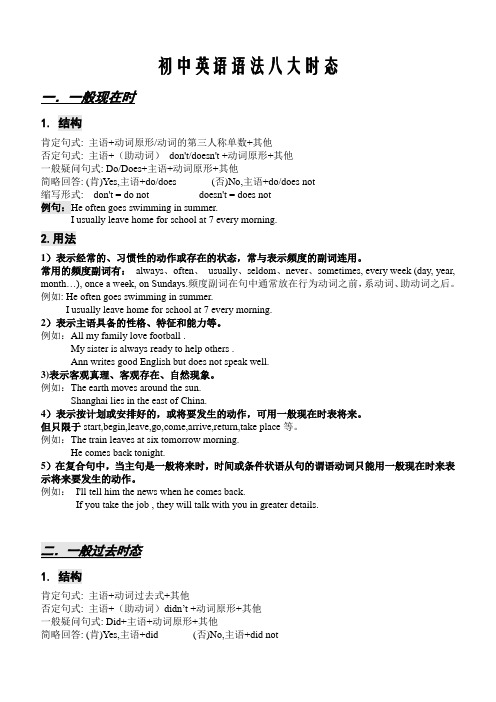
— I'm going to go fishing.
— Where is the telephone book?
— I'll go and get it for you.
两者都用于预测时,be going to意指有迹象表明某件事将要发生,属客观的推测;will则意指说话人认为/相信某件事将要发生,属主观的推测。
2)、表示说话人对于将来的看法、假设和推测,通常用于be afraid, be/feel sure, hope, know, think等后面的从句或与副词perhaps,possibly,maybe等连用。
例如:I think she’ll go back home for supper.
Maybe she’ll go to the gym.
认知类
Believe,think,understand,forget,remember
存在类
Appear,exist,lie,remain
占有、从属类
Have,own,contain,belong,possess,consist of
短暂动作类
Accept,receive,admit,decide,promise,give,finish
2)“beto+动词原形”表示客观安排或受人指示而将要做某事。
例如:We are to discuss the report next Saturday.
3)be about to +动词原形,意为马上做某事。不能与tomorrow, next week等表示明确将来时的时间状语连用,多于when引导的时间状语连用。
初中英语十大时态汇总

初中英语十大时态汇总(初二年级下火箭)一:基本结构:1:一般现在时态:主语+do/does2:一般过去时态:主语+did3:现在进行时态:主语+am/is/are +doing4:过去进行时态:主语+was/were +doing5:一般将来时态:主语+will +do,,,或:主语+am/is/are +going to +do6:过去将来时态:主语+would +do,,,或:主语+was/were+ going to +do7:现在完成时态:主语+have/has +done8:过去完成时态:主语+had +done9:现在完成进行时态:主语+have/has +been +doing10:过去完成进行时态:主语+had + been +doing二:几点说明:1:现在完成时态基本含义:(1):从过去延续到现在。
(2):强调现在的结果2:过去完成时态基本含义:(1):过去的过去。
(2):从过去的过去延续到过去。
3:现在完成进行时态属于现在完成时态的范畴,主要是指从过去延续到现在,强调不间断性。
4:一个句子的灵魂是谓语,谓语必须用动词来承担,动词必须体现时态。
5:done:代表过去分词。
例如:have +watched。
这里的watched是动词的过去分词,不是过去时。
6:过去将来时态:是指站在过去的角度说将来。
例如:他说他要走了:He said he would go。
7:现在完成时态与现在完成进行时态的区别:例如:She has watched TV for 2 hours。
She has been watching TV for 2 hours。
说明:都指从过去延续到现在,现在完成进行强调不间断性。
8:do指动词原形,does指动词的第三人称单数形式,doing指动词的ing形式,did指动词的一般过去形式,done指动词的过去分词,三:例句1:She watches TV。
(她常常看电视)2:She watched TV yesterday。
初中英语八大时态结构
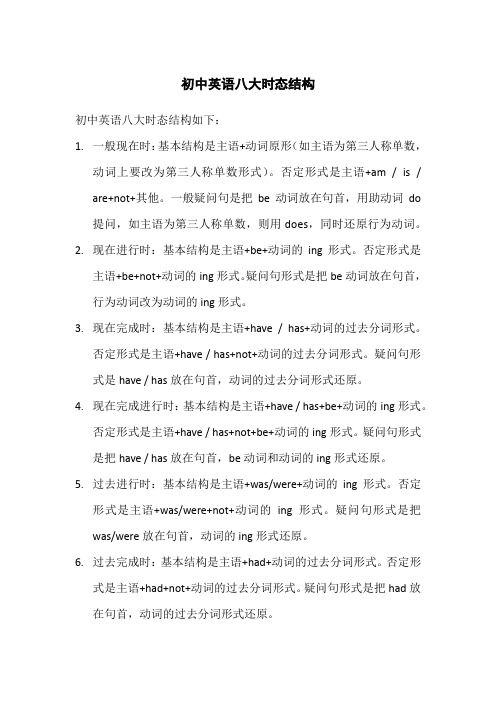
初中英语八大时态结构初中英语八大时态结构如下:1.一般现在时:基本结构是主语+动词原形(如主语为第三人称单数,动词上要改为第三人称单数形式)。
否定形式是主语+am / is / are+not+其他。
一般疑问句是把be动词放在句首,用助动词do 提问,如主语为第三人称单数,则用does,同时还原行为动词。
2.现在进行时:基本结构是主语+be+动词的ing形式。
否定形式是主语+be+not+动词的ing形式。
疑问句形式是把be动词放在句首,行为动词改为动词的ing形式。
3.现在完成时:基本结构是主语+have / has+动词的过去分词形式。
否定形式是主语+have / has+not+动词的过去分词形式。
疑问句形式是have / has放在句首,动词的过去分词形式还原。
4.现在完成进行时:基本结构是主语+have / has+be+动词的ing形式。
否定形式是主语+have / has+not+be+动词的ing形式。
疑问句形式是把have / has放在句首,be动词和动词的ing形式还原。
5.过去进行时:基本结构是主语+was/were+动词的ing形式。
否定形式是主语+was/were+not+动词的ing形式。
疑问句形式是把was/were放在句首,动词的ing形式还原。
6.过去完成时:基本结构是主语+had+动词的过去分词形式。
否定形式是主语+had+not+动词的过去分词形式。
疑问句形式是把had放在句首,动词的过去分词形式还原。
7.过去完成进行时:基本结构是主语+had+be+动词的ing形式。
否定形式是主语+had+not+be+动词的ing形式。
疑问句形式是把had 放在句首,be动词和动词的ing形式还原。
8.一般将来时:基本结构是主语+will/shall/be going to+动词原形。
否定形式是主语+will/shall/be going to+not+动词原形。
疑问句形式是把will/shall/be going to放在句首,动词原形还原。
初中英语八种时态的结构总结

八种时态的结构归纳一般现在时:谓语分为:1.be 2.行为v.be 行为v.肯定句:主语+be{am/are/is}+表语. 主语+{v-原型/v-单三)+... .否定句:主语+be{am/are/is}+not+表语. 主语+don't/doesn't+v-原型+... .一般疑问句:Be{am/are/is}+主语+表语? Do/Does+主语+v-原型+ ... ?回答:Yes,主语+{am/are/is}. Yes,主语+do/does.No,主语+am not/isn't/aren't}. No,主语+don't/doesn't. 一般过去式:谓语分为:1.be 2.行为v.be 行为v.肯定句:主语+was/were+表语. 主语+v.-过去式{v-ed/v.不规则的} +... . 否定句:主语+was/were+not+表语. 主语+didn't+v.-原型+... . 一般疑问句:Was/Were+主语+表语? Did+主语+v.-原型+... ?回答:Yes,主语+was/were. Yes,主语+did.No,主语+wasn't/weren't. No,主语+didn't.现在进行时:be{am/are/is}+v.-ing 过去进行时:was/were+v.-ing肯定句:主语+be{am/are/is}+v.-ing+... . 肯定句:主语+was/were+v.-ing+... .否定句:主语+be{am/are/is}+not+v.-ing+... 否定句:主+was/were+not+v.-ing+... .一般疑问句:Be{am/are/is}+主语+v.-ing+... ?一般疑问句:Was/Were+主+v.-ing+... ?回答:Yes,主语+{am/are/is}. 回答:Yes,主语+was/were.No,主语+am not/isn't/aren't}. No,主语+wasn't/weren't.一般将来时:1.will/shall+v.-原型2.be{am/are/is} +going +to+{v.-原型/地点}3.be{am/are/is}+to+v.-原型肯定句:1.主语+will/shall+v.-原型+... .2.主语+ be{am/are/is} +going +to+{v.-原型/地点}.3.主语+ be{am/are/is}+to+v.-原型否定句:1.主语+will/shall+not+v.-原型+... .2.主语+ be{am/are/is} +not+going +to+{v.-原型/地点}.3.主语+ be{am/are/is}+not+to+v.-原型.一般疑问句:1.Will/Shall+主语v.-原型+... ?2.Be{am/are/is}+主语+going +to+{v.-原型/地点}?3.Be{am/are/is}+主语+to+{v.-原型/地点}?肯定回答:1.Yes,主语+will/shall.2.Yes,主语+{am/are/is}.3.Yes,主语+{am/are/is}.否定回答:1.No,主语+won't/shall not.2.No,主语+{am not/aren't/isn't}.3.No,主语+{am not/aren't/isn't}.过去将来时:1.would/should+v.-原型 2.was/were+going +to+{v.-原型/地点}3.was/were+to+v.-原型肯定句:1.主语+would/should+v.-原型 +... .2.主语+was/were+going +to+{v.-原型/地点}.3.主语+was/were +to+v.-原型+... .否定句:1.主语+would/should+not+v.-原型 +... .2.主语+wasn't/weren't+going +to+{v.-原型/地点}.3.wasn't/weren't+to+v.-原型+... .一般疑问句:1.Would/Should+主语+v.-原型 +... ?2.Was/Were+主语+going +to+{v.-原型/地点}?3.Was/Were+主语+to+v.-原型+...?肯定回答:1.Yes,主语+would/should.2.Yes,主语+was/were.3.Yes,主语+was/were.否定回答:1.No,主语+wouldn't/shouldn't.2.No,主语+wasn't/weren't.3.No,主语+wasn't/weren't.现在完成时:have/has+done(v.过去分词)肯定句:主语+have/has+done(v.过去分词)+... .否定句:主语+have/has+not+done(v.过去分词)+... .一般疑问句:Have/Has+主语+done(v.过去分词)+... ?回答:Yes,主语+have/has. No,主语+haven't/hasn't.过去完成时:had+done(v.过去分词)肯定句:主语+had+done(v.过去分词)+... .否定句:主语+had+not+done(v.过去分词)+... .一般疑问句:Had+主语+done(v.过去分词)+... ?回答:Yes,主语+had.No,主语+hadn't.。
初中英语语法八大时态总结(附答案)
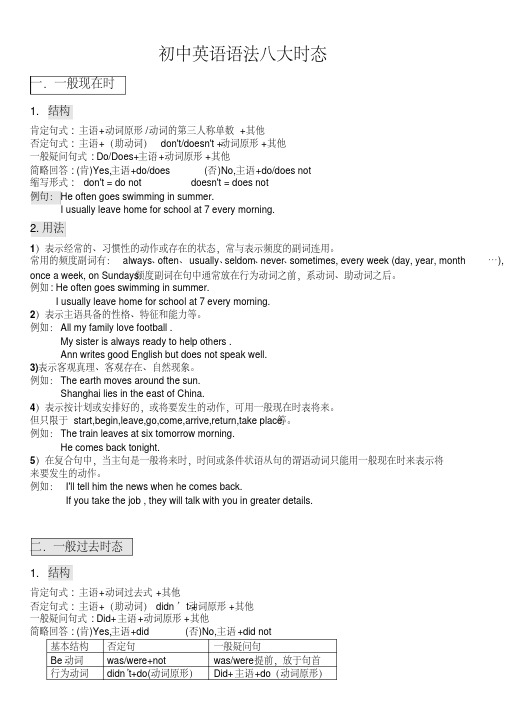
初中英语语法八大时态一.一般现在时1.结构肯定句式: 主语+动词原形/动词的第三人称单数+其他否定句式: 主语+(助动词)don't/doesn't +动词原形+其他一般疑问句式: Do/Does+主语+动词原形+其他简略回答: (肯)Yes,主语+do/does (否)No,主语+do/does not缩写形式: don't = do not doesn't = does not例句:He often goes swimming in summer.I usually leave home for school at 7 every morning.2.用法1)表示经常的、习惯性的动作或存在的状态,常与表示频度的副词连用。
常用的频度副词有:always、often、usually、seldom、never、sometimes, every week (day, year, month…), once a week, on Sundays.频度副词在句中通常放在行为动词之前,系动词、助动词之后。
例如: He often goes swimming in summer.I usually leave home for school at 7 every morning.2)表示主语具备的性格、特征和能力等。
例如:All my family love football .My sister is always ready to help others .Ann writes good English but does not speak well.3)表示客观真理、客观存在、自然现象。
例如:The earth moves around the sun.Shanghai lies in the east of China.4)表示按计划或安排好的,或将要发生的动作,可用一般现在时表将来。
初中英语八种时态基本句型及例句中考英语时态的基本结构总结归纳

初中英语八种时态基本句型及例句中考英语时态的基本结构总结归纳初中英语中,常用的八种时态基本句型及例句如下:1. 一般现在时(Simple Present Tense)句型:主语+动词原形例句:I like to play basketball.2. 一般过去时(Simple Past Tense)句型:主语+动词过去式例句:She studied hard for the test.3. 一般将来时(Simple Future Tense)句型:主语 + will + 动词原形例句:They will go to the beach next weekend.4. 现在进行时(Present Continuous Tense)句型:主语 + am/is/are + 现在分词例句:He is watching TV at the moment.5. 过去进行时(Past Continuous Tense)句型:主语 + was/were + 现在分词例句:We were playing soccer yesterday.6. 将来进行时(Future Continuous Tense)句型:主语 + will be + 现在分词7. 现在完成时(Present Perfect Tense)句型:主语 + have/has + 过去分词例句:We have already finished our homework.8. 过去完成时(Past Perfect Tense)句型:主语 + had + 过去分词例句:He had already left when I arrived.中考英语时态的基本结构如下:1. 一般现在时:主语 + 动词原形(eg. I like swimming.)2. 一般过去时:主语 + 动词过去式(eg. She studied English last night.)3. 一般将来时:主语 + will + 动词原形(eg. We will go to the park tomorrow.)4. 现在进行时:主语 + am/is/are + 现在分词(eg. They are playing soccer now.)5. 现在完成时:主语 + have/has + 过去分词(eg. She has already finished her homework.)6. 过去进行时:主语 + was/were + 现在分词(eg. I was readinga book yesterday.)7. 过去完成时:主语 + had + 过去分词(eg. We had already left when you arrived.)8. 将来完成时:主语 + will have + 过去分词(eg. They will have finished the project by next week.)。
初中英语八种时态基本句型
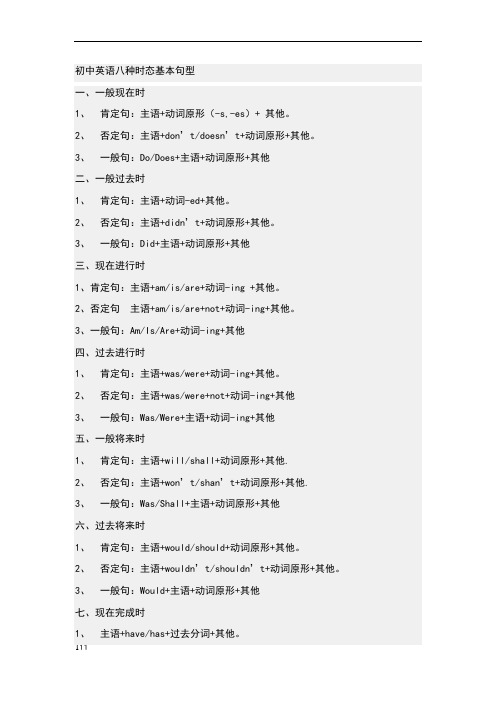
初中英语八种时态基本句型一、一般现在时1、肯定句:主语+动词原形(-s,-es)+ 其他。
2、否定句:主语+don’t/doesn’t+动词原形+其他。
3、一般句:Do/Does+主语+动词原形+其他二、一般过去时1、肯定句:主语+动词-ed+其他。
2、否定句:主语+didn’t+动词原形+其他。
3、一般句:Did+主语+动词原形+其他三、现在进行时1、肯定句:主语+am/is/are+动词-ing +其他。
2、否定句主语+am/is/are+not+动词-ing+其他。
3、一般句:Am/Is/Are+动词-ing+其他四、过去进行时1、肯定句:主语+was/were+动词-ing+其他。
2、否定句:主语+was/were+not+动词-ing+其他3、一般句:Was/Were+主语+动词-ing+其他五、一般将来时1、肯定句:主语+will/shall+动词原形+其他.2、否定句:主语+won’t/shan’t+动词原形+其他.3、一般句:Was/Shall+主语+动词原形+其他六、过去将来时1、肯定句:主语+would/should+动词原形+其他。
2、否定句:主语+wouldn’t/shouldn’t+动词原形+其他。
3、一般句:Would+主语+动词原形+其他七、现在完成时1、主语+have/has+过去分词+其他。
2、主语+haven’t/hasn’t+过去分词+其他。
3、 Have/Has+主语+过去分词+其他八、过去完成时1、肯定句:主语+had+过去分词+其他。
2、否定句:主语+hadn’t+过去分词+其他。
3、一般句:Had+主语+过去分词+其他A)、名词的数名词可以分为可数名词和不可数名词,而不可数名词它没有复数形式,但可数名词却有单数和复数之分,复数的构成如下:一)在后面加s。
如:fathers, books, Americans, Germans, apples, bananas 二)x, sh, ch, s, tch后加es。
初中英语句子的时态
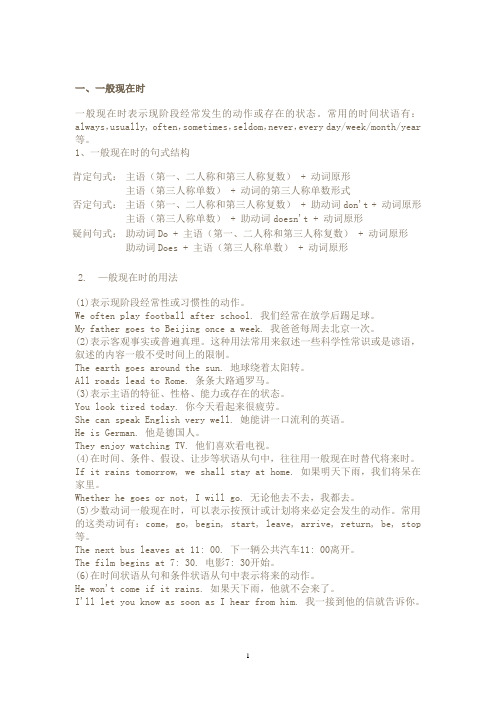
一、一般现在时一般现在时表示现阶段经常发生的动作或存在的状态。
常用的时间状语有:always,usually, often,sometimes,seldom,never,every day/week/month/year 等。
1、一般现在时的句式结构肯定句式:主语(第一、二人称和第三人称复数) + 动词原形主语(第三人称单数) + 动词的第三人称单数形式否定句式:主语(第一、二人称和第三人称复数) + 助动词don't + 动词原形主语(第三人称单数) + 助动词doesn't + 动词原形疑问句式:助动词Do + 主语(第一、二人称和第三人称复数) + 动词原形助动词Does + 主语(第三人称单数) + 动词原形2. —般现在时的用法(1)表示现阶段经常性或习惯性的动作。
We often play football after school. 我们经常在放学后踢足球。
My father goes to Beijing once a week. 我爸爸每周去北京一次。
(2)表示客观事实或普遍真理。
这种用法常用来叙述一些科学性常识或是谚语,叙述的内容一般不受时间上的限制。
The earth goes around the sun. 地球绕着太阳转。
All roads lead to Rome. 条条大路通罗马。
(3)表示主语的特征、性格、能力或存在的状态。
You look tired today. 你今天看起来很疲劳。
She can speak English very well. 她能讲一口流利的英语。
He is German. 他是德国人。
They enjoy watching TV. 他们喜欢看电视。
(4)在时间、条件、假设、让步等状语从句中,往往用一般现在时替代将来时。
If it rains tomorrow, we shall stay at home. 如果明天下雨,我们将呆在家里。
初中英语语法六大时态

初中英语语法六大时态初中英语通常涵盖的六大时态是:一般现在时、一般过去时、一般将来时、现在进行时、过去进行时和现在完成时。
以下是这些时态的基本结构和用法:1.一般现在时 (Present Simple)1.结构:主语+ 动词原形(第三人称单数使用动词第三人称单数形式)2.用途:描述经常发生的动作或状态;表达客观事实、普遍真理或习惯性动作;表示主语的特征或状态。
3.例子:She always gets up early. (她总是早起。
)2.一般过去时 (Past Simple)1.结构:主语+ 动词过去式2.用途:描述过去某个时间发生的动作或状态;叙述过去的事实或经历。
3.例子:I watched TV last night. (我昨晚看了电视。
)3.一般将来时 (Future Simple)1.结构:主语+ will + 动词原形2.用途:表示将来某个时间要发生的动作或状态;表示计划、意愿或预测。
3.例子:She will go to the party tomorrow. (她明天要去参加聚会。
)4.现在进行时 (Present Continuous)1.结构:主语+ be 动词(am/is/are)+ 动词-ing2.用途:描述当前正在进行的动作或正在发生的情况。
3.例子:They are playing football now. (他们现在正在踢足球。
)5.过去进行时 (Past Continuous)1.结构:主语+ be 动词的过去式(was/were)+ 动词-ing2.用途:描述过去某个时间正在进行的动作或状态。
3.例子:When I was a child, I was always playing outside. (当我还是个孩子的时候,我总是在外面玩。
)6.现在完成时 (Present Perfect)1.结构:主语+ have/has + 过去分词2.用途:描述过去发生的动作对现在造成的影响或结果;表示从过去某个时间开始一直持续到现在的动作或状态。
初中英语时态句式归纳总结

初中英语时态句式归纳总结英语时态是表示动作发生的时间的一种语法形式。
在初中英语学习中,掌握不同时态的句式结构是非常重要的。
本文将总结初中英语时态的句式,以帮助同学们更好地掌握并运用时态。
一、一般现在时1. 肯定句:主语 + 动词原形(第三人称单数需要加-s)例: She walks to school every day.2. 否定句:主语 + do/does + not + 动词原形例: They do not watch TV in the morning.3. 一般疑问句:Do/Does + 主语 + 动词原形?例: Does he play basketball on weekends?4. 特殊疑问句:特殊疑问词 + 一般疑问句句式例: What does she do after school?二、一般过去时1. 肯定句:主语 + 动词过去式例: He visited his grandparents last weekend.2. 否定句:主语 + did not + 动词原形例: We did not finish our homework yesterday.3. 一般疑问句:Did + 主语 + 动词原形?例: Did they go to the park this morning?4. 特殊疑问句:特殊疑问词 + 一般疑问句句式例: When did you watch the movie?三、一般将来时1. 肯定句:主语 + will + 动词原形例: She will visit her friend next Sunday.2. 否定句:主语 + will not + 动词原形例: They will not go to the party tomorrow. 3. 一般疑问句:Will + 主语 + 动词原形?例: Will he help me with my homework?4. 特殊疑问句:特殊疑问词 + 一般疑问句句式例: How will they go to the zoo?四、现在进行时1. 肯定句:主语 + am/is/are + 动词-ing例: They are playing soccer in the park.2. 否定句:主语 + am/is/are + not + 动词-ing例: I am not watching TV right now.3. 一般疑问句:Am/Is/Are + 主语 + 动词-ing?例: Are you studying English at the moment?4. 特殊疑问句:特殊疑问词 + 一般疑问句句式例: What are they doing in the kitchen?五、过去进行时1. 肯定句:主语 + was/were + 动词-ing例: He was watching a movie at that time.2. 否定句:主语 + was/were + not + 动词-ing例: We were not studying last night.3. 一般疑问句:Was/Were + 主语 + 动词-ing?例: Were they playing basketball when you saw them?4. 特殊疑问句:特殊疑问词 + 一般疑问句句式例: What were you doing at 8 o'clock yesterday evening?六、将来进行时1. 肯定句:主语 + will be + 动词-ing例: She will be studying English at this time tomorrow.2. 否定句:主语 + will not be + 动词-ing例: They will not be working on the project next week.3. 一般疑问句:Will + 主语 + be + 动词-ing?例: Will you be waiting for me at the airport?4. 特殊疑问句:特殊疑问词 + 一般疑问句句式例: What will they be doing at this time next year?通过对初中英语时态句式的总结,希望可以帮助同学们更好地掌握和运用不同的时态,在写作和口语表达中能够准确地描述动作发生的时间。
初中英语16大时态结构句式公式

初中英语16大时态结构句式公式1. Simple Present (Present Simple)- Subject + base form of the verb + other elements.- Example: She works at a school.2. Present Continuous (Present Progressive)- Subject + am/is/are + present participle (verb+ing) + other elements.- Example: They are playing soccer.3. Present Perfect (Present Perfect Simple)- Subject + have/has + past participle + other elements.- Example: We have visited 10 countries.4. Present Perfect Continuous (Present Perfect Progressive)- Subject + have/has been + present participle + other elements.- Example: She has been studying for the exam.5. Simple Past (Past Simple)- Subject + past form of the verb + other elements.- Example: The concert started at 8 PM.6. Past Continuous (Past Progressive)- Subject + was/were + present participle + other elements.- Example: They were watching a movie.7. Past Perfect (Past Perfect Simple)- Subject + had + past participle + other elements.- Example: She had finished her homework before going out.8. Past Perfect Continuous (Past Perfect Progressive)- Subject + had been + present participle + other elements.- Example: The rain had been falling for hours.9. Simple Future (Future Simple)- Subject + will + base form of the verb + otherelements.- Example: I will travel to Paris next year.10. Future Continuous (Future Progressive)- Subject + will be + present participle + other elements.- Example: They will be playing a match tomorrow.11. Future Perfect (Future Perfect Simple)- Subject + will have + past participle + other elements.- Example: We will have learned 1000 words by June.12. Future Perfect Continuous (Future Perfect Progressive)- Subject + will have been + present participle +other elements.- Example: She will have been working here for five years next month.13. Present Perfect with 'since' or 'for'- Subject + have/has + past participle +'since'/'for' + time period/point in time.- Example: He has lived here for five years.14. Past Perfect with 'before' or 'until'- Subject + had + past participle + 'before'/'until'+ time/event.- Example: She hadn't seen him before the party.15. Future Perfect with 'by'- Subject + will have + past participle + 'by' + time.- Example: The project will have been completed bynext quarter.16. Modal Verbs with Tenses- Modal verb (can, could, may, might, must, shall, should, will, would) + base form of the verb (forpresent/future) or past participle (for perfect tenses).- Example (Present Modal): She can play the piano.- Example (Future Modal): We should arrive early.- Example (Perfect Modal): They might have missed the train.Each of these tenses is used to express different times and aspects of actions or states, and they are essential forconstructing sentences that convey the correct meaning in English.。
初中英语时态归纳总结
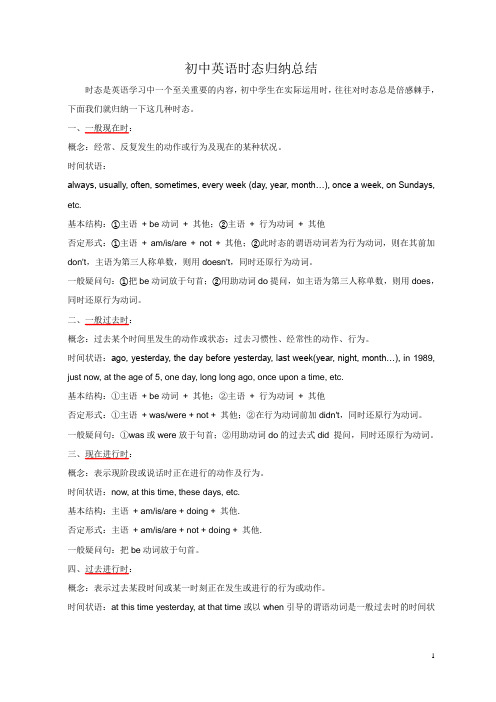
初中英语时态归纳总结时态是英语学习中一个至关重要的内容,初中学生在实际运用时,往往对时态总是倍感棘手,下面我们就归纳一下这几种时态。
一、一般现在时:概念:经常、反复发生的动作或行为及现在的某种状况。
时间状语:always, usually, often, sometimes, every week (day, year, month…), once a week, on Sundays, etc.基本结构:①主语+ be动词+ 其他;②主语+ 行为动词+ 其他否定形式:①主语+ am/is/are + not + 其他;②此时态的谓语动词若为行为动词,则在其前加don't,主语为第三人称单数,则用doesn't,同时还原行为动词。
一般疑问句:①把be动词放于句首;②用助动词do提问,如主语为第三人称单数,则用does,同时还原行为动词。
二、一般过去时:概念:过去某个时间里发生的动作或状态;过去习惯性、经常性的动作、行为。
时间状语:ago, yesterday, the day before yesterday, last week(year, night, month…), i n 1989, just now, at the age of 5, one day, long long ago, once upon a time, etc.基本结构:①主语+ be动词+ 其他;②主语+ 行为动词+ 其他否定形式:①主语+ was/were + not + 其他;②在行为动词前加didn't,同时还原行为动词。
一般疑问句:①was或were放于句首;②用助动词do的过去式did 提问,同时还原行为动词。
三、现在进行时:概念:表示现阶段或说话时正在进行的动作及行为。
时间状语:now, at this time, these days, etc.基本结构:主语+ am/is/are + doing + 其他.否定形式:主语+ am/is/are + not + doing + 其他.一般疑问句:把be动词放于句首。
初中英语七大时态的概念

七大时态的概念1.一般现在时一般现在时表示经常性、习惯性的动作或状态,常与always,often,sometimes等连用。
其基本句式为:主语+动词原形+其他。
错误示例:He always eat breakfast at seven.(错)正确示例:He always eats breakfast at seven.(对)2.现在进行时现在进行时表示此时此刻正在进行的动作或状态,其基本句式为:主语+be动词+动词现在分词+其他。
错误示例:They are having a meeting tomorrow.(错)正确示例:They are having a meeting now.(对)3.现在完成时现在完成时表示过去发生的动作或状态对现在产生的影响或结果,其基本句式为:主语+have/has+动词过去分词+其他。
错误示例:I have buy a book.(错)正确示例:I have bought a book.(对)4.一般过去时一般过去时表示过去某个时间点或过去经常发生的动作或状态,常与last week,yesterday等连用。
其基本句式为:主语+动词过去式+其他。
错误示例:They went to the park yesterday.(错)正确示例:They went to the park last week.(对)5.过去进行时过去进行时表示过去某个时间点正在进行的动作或状态,其基本句式为:主语+was/were+动词现在分词+其他。
错误示例:She was having a shower at nine o’clock yesterday.(错)正确示例:She was having a shower at nine o’clock yesterday morning.(对)6.过去完成时过去完成时表示过去某个时间点之前已经完成的动作或状态,其基本句式为:主语+had+动词过去分词+其他。
初中英语的八大时态结构

初中英语的八大时态结构英语中八种基本时态有:一般现在时、一般过去时、现在进行时、过去进行时、现在完成时、过去完成时、—般将来时、过去将来时。
一、一般现在时基本结构:1)动词+原形(如主语为第三人称单数,谓语动词上要加s,es,或变y为i,再加es)2)如果含有be动词:主语+is/am/are+形容词/名词/介词短语等(主语为第三人称单数用is,主语为I用am,主语为复数用are)例句:Our teachers always arrive early.I am an English teacher.二、一般过去时基本结构:1)主语+动词过去式2)如果含有be动词:主语+was/were+形容词/名词/介词短语等(主语为单数用was,主语为复数用are)例句:She sang a song in class yesterday.They were here just now.三、现在进行时基本结构:am/is/are+doing(主语为I用am,主语为第三人称单数用is,主语为复数用are)例句:It's getting colder and colder.They are doing well in their lessons.四、过去进行时基本结构:was/were + doing例句:She was working at nine o'clock yesterday?When I arrived, they were reading a story.五、现在完成时基本结构:has/have + done(过去分词)(主语为单数用has,主语为复数用have)例句:It has rained recently.They have lived here for more than twenty years.六、过去完成时基本结构:had + done(过去分词)例句:By the end of last week,they had reviewed four books.He had bought the car before 2003.七、一般将来时基本结构:1)is/am/are + going to + do(主语为第三人称单数用is,主语为I用am,主语为复数用are)2) shall/will + do(主语为第一人称可用shall/will,其他人称用will)例句:We are going to visit the factory tomorrow.I think she will be back next week.八、过去将来时基本结构:1)was/were + going to + do(主语为单数用was,主语为复数用were)2)would + do例句:They told me they would go to Beijing.The doctor asked who was going there.。
初中英语语法八大时态总结(完整版)
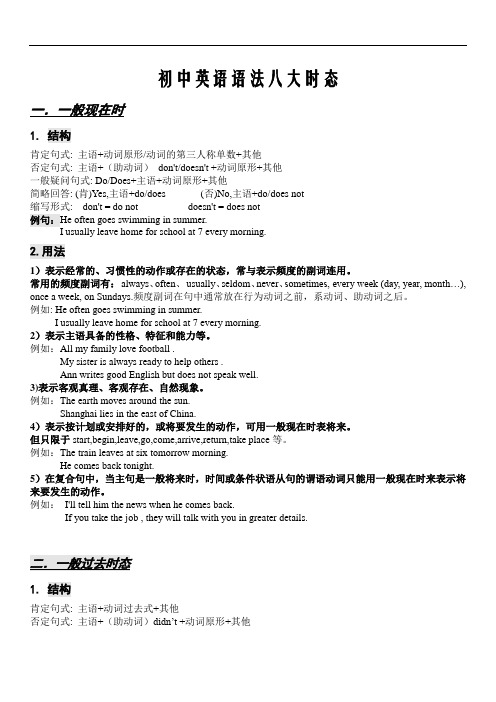
初中英语语法八大时态一.一般现在时1.结构肯定句式: 主语+动词原形/动词的第三人称单数+其他否定句式: 主语+(助动词)don't/doesn't +动词原形+其他一般疑问句式: Do/Does+主语+动词原形+其他简略回答: (肯)Yes,主语+do/does (否)No,主语+do/does not缩写形式: don't = do not doesn't = does not例句:He often goes swimming in summer.I usually leave home for school at 7 every morning.2.用法1)表示经常的、习惯性的动作或存在的状态,常与表示频度的副词连用。
常用的频度副词有:always、often、usually、seldom、never、sometimes, every week (day, year, month…), once a week, on Sundays.频度副词在句中通常放在行为动词之前,系动词、助动词之后。
例如: He often goes swimming in summer.I usually leave home for school at 7 every morning.2)表示主语具备的性格、特征和能力等。
例如:All my family love football .My sister is always ready to help others .Ann writes good English but does not speak well.3)表示客观真理、客观存在、自然现象。
例如:The earth moves around the sun.Shanghai lies in the east of China.4)表示按计划或安排好的,或将要发生的动作,可用一般现在时表将来。
初中英语时态8种基本时态结构 -回复
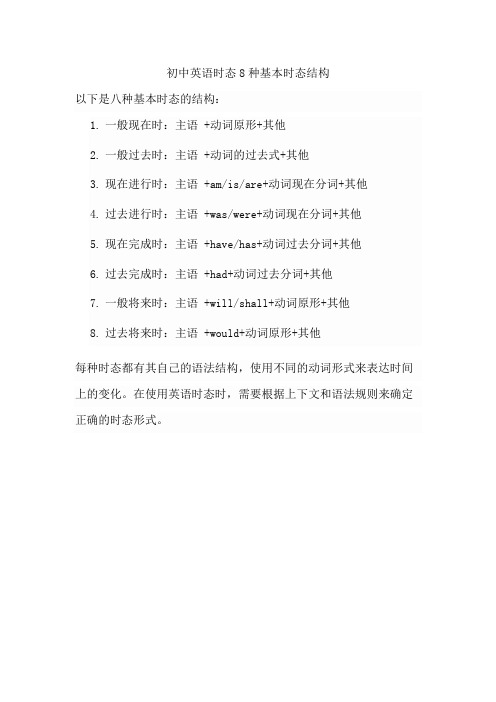
初中英语时态8种基本时态结构
以下是八种基本时态的结构:
1.一般现在时:主语 +动词原形+其他
2.一般过去时:主语 +动词的过去式+其他
3.现在进行时:主语 +am/is/are+动词现在分词+其他
4.过去进行时:主语 +was/were+动词现在分词+其他
5.现在完成时:主语 +have/has+动词过去分词+其他
6.过去完成时:主语 +had+动词过去分词+其他
7.一般将来时:主语 +will/shall+动词原形+其他
8.过去将来时:主语 +would+动词原形+其他
每种时态都有其自己的语法结构,使用不同的动词形式来表达时间上的变化。
在使用英语时态时,需要根据上下文和语法规则来确定正确的时态形式。
英语8种时态

初中英语八种时态归纳复习时态是英语学习中一个至关重要的内容,广大初中学生在实际运用时,往往对时态问题倍感棘手,下面我们就归纳复习一下这几种时态。
一、一般现在时(一)定义表示经常性或习惯性的动作,或存在的状态,还表示主语具备的性格和能力及客观真理。
例:I get up at 6:30 in the morning 。
She is at home 。
(二)构成主要用动词原形表示,当主语是第三人称单数时,在动词词尾加s/es。
(三)句型1、肯定句:主语+谓语+其他。
She reads English everyday .2、否定句:主语+don’t/doesn't+谓语+其他。
He doesn’t get up at 6:30 in the morning .3、一般疑问句:Do/Does+主语+V原+其他?Do you like English ? Yes ,I do 。
/No, I don’t .4、特殊疑问句:特殊疑问词+do/does+主语+V原+其他?What time do you get up every morning ? Where does your father work ?(三)用法1、表示经常性或习惯性的动作,或存在的状态,带与表示频率的时间状语如:often , sometimes , usually,always , everyday year,month...), once/twice a week (month , year , etc.) , seldom , on Sundays等连用。
I leave home for school at seven every morning .2、表示客观真理,科学事实、格言警句。
The sun rises in the east .日出东方.The earth goes around the sun .地球绕着太阳转。
初中英语 8 大时态结构总结,你都掌握了吗?

初中英语 8大时态结构总结,你都掌握了吗?一、一般现在时1、概念:表示经常发生的情况;有规律出现的情况;总是发生的;事实真理。
2.时间状语: Always, usually, often, sometimes, every week (day, year, month…), once a week (day, year, month…), on Sundays (on Mondays…), etc.3.基本结构:主语+动词原形(如主语为第三人称单数,动词上要改为第三人称单数形式)4.否定形式:主语+am / is / are+not+其他;此时态的谓语动词若为行为动词,则在其前加 don't,如主语为第三人称单数,则用 doesn't,同时还原行为动词。
5.一般疑问句:把 be 动词放于句首;用助动词 do 提问,如主语为第三人称单数,则用 does,同时,还原行为动词。
eg:①It seldom snows here. 这里很少下雪。
②He is always ready to help others. 他总是乐于帮助别人。
③Action speaks louder than words. 事实胜雄辩。
二、一般过去时1.概念:过去某个时间里发生的动作或状态;过去习惯性、经常性的动作、行为。
2.时间状语:ago, yesterday, the day before yesterday, last week, last(year,night,month…), in 1989, just now, at the age of 5, one day, long long ago, once upon a time,etc.3.基本结构:主语+动词的过去式或 be 的过去式+名词4.否定形式:主语+was / were+not+其他;在行为动词前加didn't,同时还原行为动词。
初中英语的八大时态

初中英语的八大时态时态无疑是学校英语最重要的语法内容,学好时态基本就拿下了语法的半壁江山。
,我在这里整理了学校英语的八大时态,盼望能关心到大家。
一般现在时一1. 概念:常常、反复发生的动作或行为及现在的某种状况。
2. 基本结构:①is/am/are;②do/does否定形式:①am/is/are+not;②此时态的谓语动词若为行为动词,则在其前加dont,如主语为第三人称单数,则用doesnt,同时还原行为动词。
3. 一般疑问句:①把is/am/are动词放于句首;②用助动词do 提问,如主语为第三人称单数,则用does,同时,还原行为动词。
4. 用法1) 常常性或习惯性的动作,常与表示频度的时间状语连用。
例如:I leave home for school at 7 every morning. 每天早上我七点离开家。
2) 客观真理,客观存在,科学事实。
例如:The earth moves around the sun. 地球绕太阳转动。
Shanghai lies in the east ofChina. 上海位于中国东部。
3) 表示格言或警句。
例如:Pride goes before a fall. 骄者必败。
留意:此用法假如消失在宾语从句中,即使主句是过去时,从句谓语也要用一般现在时。
例如:Columbus proved that the earth is round. 哥伦布证明了地球是圆的。
4) 现在时刻的状态、力量、性格、共性。
例如:I dont want so much. 我不要那么多。
Ann writes good English but does not speak well.安英语写得不错,讲的可不行。
5) 一般现在时表示将来含义a. 下列动词come, go, arrive, leave, start, begin, return的一般现在时可以表示将来,主要用来表示在时间上已确定或支配好的事情。
- 1、下载文档前请自行甄别文档内容的完整性,平台不提供额外的编辑、内容补充、找答案等附加服务。
- 2、"仅部分预览"的文档,不可在线预览部分如存在完整性等问题,可反馈申请退款(可完整预览的文档不适用该条件!)。
- 3、如文档侵犯您的权益,请联系客服反馈,我们会尽快为您处理(人工客服工作时间:9:00-18:30)。
初中英语时态的基本句式1. He ______ for ______ at 7 every morning. 每天早上他七点离开家上学。
2. The earth ______ around the sun. 地球绕太阳转动。
3. Shanghai ______ in the east of China. 上海位于中国东部。
4. I __________ my homework now. 我正在做功课。
5.It is time you _____ to bed. 你早该睡觉了。
6.I'd rather you _________ tomorrow.还是明天来吧。
7.________ you lend me your bike? 你的自行车,能借用一些吗?8. Mother used not to be so forgetful. _________________________9. Scarf ______________ a walk. 斯卡夫过去常常散步。
10. Scarf_______________ a walk. 斯卡夫现在已习惯于散步了11. _______ you _____ at home at seven this evening? 今晚七点回家好吗?12._________________________________ 明天打算作什么呢?13.The play ____________________(produce)。
这出戏下月开播。
14. Look at the dark clouds, ________________________ a storm. 看那乌云,快要下雨了。
15. When Bill _________ , ask him to wait for me.16. When the police ________, the thieves __________ away. 警察到达时,小偷们早就跑了。
17. We _________ that you _________, but you didn't.那时我们希望你能来,但是你没有来。
18. He said that he ___________some English before. 他说过他以前学过一些英语。
19. By the time he ______ twelve, Edison_________________________.到了十二岁那年,爱迪生开始自己谋生。
20. Tom ____________ that most of the guests _________ when he ________ theparty. 汤姆失望了,因为他到达晚会时,大部分客人已经走了。
21. I had no sooner got into the room than it began to snow.22. I _____________ the door when he______ me.(hardly------when----)我刚打开门,他就打了我。
23. He __________________ the car than he______ it.(no sooner -----than-----)他刚买了这辆车,转眼又卖了。
24.When she ______ the mouse,she _______. 她看到老鼠,就叫了起来。
25. My aunt ________ me a hat _____________ it. 姑妈给了我一顶帽子,我把它丢了。
26.When I heard the news, I was very excited.我听到消息时,非常激动。
27. There had been 25 parks in our city up till 2000.28. By the end of last term we had finished the book.29. We _______________________ you. 我们正在等你。
30. The leaves___________________ red. 叶子在变红。
31. _______________ warmer and warmer. 天越来越热了。
32. This house _________________________(belong). 这房子是我姐的。
33. He _______ her very much. 他爱她很深。
34. I______ your advice. 我接受你的劝告。
35. Ann ____good English but does not speak well. 安英语写得不错,讲的可不行。
36. Where ____________ just now? 刚才你上哪儿去了?37. Mrs. Darby lived in Kentucky for seven years. __________________________38. Mrs. Darby has lived in Kentucky for seven years. _________________39. What ____ you _____ at nine last night? (昨晚九点你在干什么?)40.I wonder/was wondering if you could help me.能不能帮我一下?41---- Your phone number again? I ___ quite catch it.---- It's 69568442. A. didn't B. couldn't C. don't D. can't42.Which paragraph _______ I read first?我先读哪一段呢?43.We ______to discuss the report next Saturday.我们下星期六讨论这份报告44.The radio _____________(repair) when you called me.45.He ___(talk)a walk leisurely by the lake when he heard someone shouting for help. 46.I ______ to play football tomorrow afternoon. 明天下午我去踢球。
(客观安排)47. I_______play football tomorrow afternoon. 明天下午我想去踢球。
(主观安排)48. The train__________ at six tomorrow morning. 火车明天上午六点开。
49. When _____the bus start? It starts in ten minutes. 汽车什么时候开?十分钟后。
50. Here _______the bus. = The bus _____________. 车来了。
51.There ________ the bell. = The bell is ringing. 铃响了。
52.I________ you as soon as I ________ there. 我到了那里,就写信给你。
53.Make sure that the windows _______closed before you leave theroom. 离开房间前,务必把窗户关了。
54.I'm leaving tomorrow. ___________。
55. _______you staying here till next week? 你会在这儿呆到下周吗?56.I saw this film yesterday. ______________________57..I have seen this film. _________________58.Why _______you _________ so early? (你起床怎么如此早?)59.Who hasn't handed in his paper? (谁还没交卷子?)60.He __________________ the League for three years. (入团)He has been a League member for three years. (是团员的状态可持续)61.This _____ the most interesting film _____I have ever seen.62.That is the only book_______ he has written.63.He used to smoke a lot.64.He has got used to getting up early.65.He promised to buy me a computer if he ____(get) a raise66.The boy was doing his homework when his father _____(come) back from work.67.Tom _________________ his parents last night.(写信)68.It is the first time that I ___________(visit)the city.69.This is the first time (that)I_________ (hear)him sing. 这是我第一次听他唱歌。
70._____ it _____raining yet ?(雨停了吗?)71.This is the best film that _______________ 这是我看过的最好的电影。
72. ---Do you know our town at all?---No, this is the first time I ___ here.A. wasB. have beenC. cameD. am coming73. ---Have you ____ been to our town before?---No, it's the first time I ___ here.A. even, comeB. even, have comeC. ever, comeD. ever, have come74.I _________________________for almost a month(没收到他的信).75.I worked here for more than twenty years. (_________________________)76.I have worked here for many years.(_________________________)77.Tom has studied Russian for three years. = Tom _____________________three years ago, and is still studying it now.78.This is my first time that I have visited China.79.Harry _________________ six years ago. 或Harry hasbeen married for six years.80.I have been here since 1989.81.I _______(be) here since five months ago.82.Great changes __________(take place) since you _______(leave) 你走后,变化可大了。
